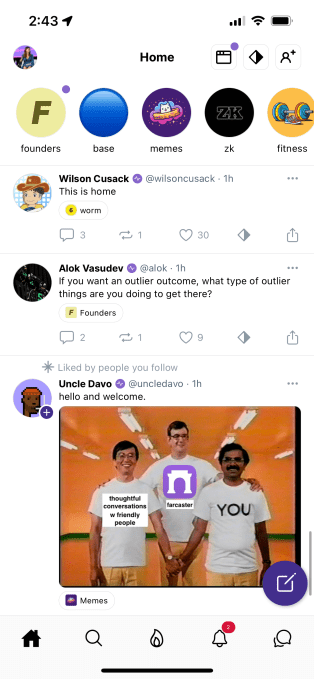The web3 world has long hoped for a blockchain-based consumer application that could reach escape velocity, bringing crypto technology to the masses. Farcaster is hoping it’ll happen through its network.
More often than not, it’s rare for crypto native users to have an easy, quick onboarding experience. For Farcaster, a network for decentralized social applications, the process was as smooth as it could be when I tested it.
From start to finish, it took me four minutes to set up an account. Farcaster tried to get around the cold start problem by populating my feed. By the time my account was live, I was following 60 accounts, which I presume came from me selecting interests beforehand. I also had one follower; feel free to follow me here.
It also doesn’t allow users to sign up for Farcaster with a crypto wallet, one of the network’s co-founders Dan Romero wrote on X, to allow more users to sign up more quickly. “The best way to do that is to make onboarding as [Web 2.0] as possible — mobile-first, no wallet required, no crypto required.”
Farcaster is a network, and it has some apps running on it today. The biggest application on Farcaster is Warpcast, a platform with designs like X’s or Reddit’s, allowing users to write posts, or “casts,” and do other functions like mint NFTs, claim tokens and transact.

Farcaster should become more capable over time. “Since Farcaster is public and decentralized, anyone can build an app to read and write data. Users own their accounts and relationships with other users and are free to move between different apps,” according to its docs page. This is pretty standard for protocols or decentralized networks that allow other applications to build on top of their technology.
Given that the application is a decentralized, public ecosystem, builders and users alike can create applications connected to the network that will open the door to more social media–like activities.
Rapid growth
Farcaster, which was founded by former Coinbase employees Romero and Varun Srinivasan in 2020, didn’t see explosive growth early on. But the co-founders might be onto something here as the network has seen 10x the growth in daily active users (DAU) in the past 14 days, Romero shared on Tuesday.
As it stands, Farcaster’s DAU tally is over 61,500, thanks to a key application update, Frames, that attracted a crowd of new users thanks to an ability to turn any “cast” into an interactive app.
The day before Frames’ launch, January 25, Farcaster had around 2,200 DAU on a seven-day trailing average, according to Dune analytics user pixelhack. At the time of publication, over 140,000 users have signed up for Farcaster, which is a nominal number compared to traditional social media networks. But it’s a strong wave of momentum by crypto standards.
The following chart makes it plain that Farcaster is having a moment:

On that note, Frames launched on January 26 as a feature to allow users to perform a number of activities — either on-chain or off-chain without having to leave Farcaster.
For crypto people, this is huge: It means no more swapping from one app to another just to get a transaction done. And for those concerned about scams or malicious attacks, Romero said on X in late January that its authorization system that’s baked into the ecosystem eliminates security risks and is “not spooftable.” (Of course, hackers will test that claim more frequently as the network itself grows.)
And for the normies out there, even though the application is built on Optimism, a layer 2 blockchain focused on scaling the Ethereum network, Farcaster brings a Web 2.0-like experience.
Joining the application requires a U.S.-based phone number for a free sign-up, paying $5 for an in-app purchase, or having a friend already on the app who can pay $3 for your invite. The associated cost aspect may be irritating to some, but it’s Farcaster’s attempt to prevent bot activity, something that plagues other social networks. The service also limits the number of “casts” users can post on the network’s applications, potentially limiting the reach and efficacy of bots, which often come under crypto posts on X.
Given that the application is decentralized and has crypto-related features, users can buy warps, its in-app currency, to “perform a variety of onchain and Warpcast-specific actions,” like creating a channel on Farcaster where you can bring users with shared interests together. That costs 2,500 warps ($25) annually. People can also get 50 warps by inviting friends if they join via your link, which is a common rewards-based tactic to gain adoption that has been used by web3 and normal apps for some time.
The application’s strategy differs from other web3 social applications — and seems to be paying off. With Aave’s Lens protocol or Friend.tech, focus was placed on using blockchains and web3 technology to have a social experience, while Farcaster aims to hone in on Web 2.0 strategies with additional blockchain capabilities like individuals controlling their own data, interoperability of applications on the network and lack of censorship mixed in.
Cautionary tales
While Farcaster is enjoying quick growth today, we’ll need to see more data over a longer period of time before we can declare it a winner in its own right, let alone something that could change the trajectory of mainstream crypto adoption. To that end, we’ve seen some crypto-friendly social projects rise quickly — and fall just as rapidly.
In August, Friend.tech saw a quick boom in transactions and growth, but within weeks those same indicators plummeted, according to Dune analytics by user cryptokoryo. Many people have accounts on Bluesky, Threads, Mastodon and the like, but after the initial hype around a new network slows, how many users still go on those pages every day?
In order to keep the momentum alive, networks and projects alike have to keep shipping out new upgrades, applications or tools to engage users. And the core loop must be predicated on something more than speculation to last, prior web3 experiments in social networks indicate.
As it stands, Frames’ on-chain functionality is only available for Ethereum-connected networks, but the founders have teased that support will be expanding to other blockchains like Solana, Romero said on X. “People are asking for it. So we ship,” he added.































Comment